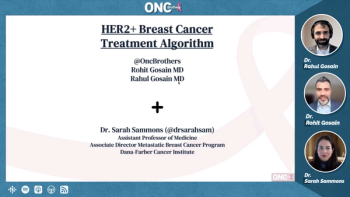
Data Reveals DNA Variations that Alter Breast Cancer Risk in Women
A recent study found 32 new sites on the human genome where variations in a woman’s DNA could alter her risk level, both increase and decrease, of getting breast cancer.
Data revealed 32 new sites on the human genome where variations in DNA appear to alter the risks of getting breast cancer, according to a study published in Nature Genetics.
This analysis of genetic studies covering 266,000 women is the first to link these specific risk variants to multiple, detailed subtypes of breast cancer.
“The findings from this analysis enhance our understanding of the biology that differentiates subtypes and may improve our ability to predict women’s breast cancer risks, even at the level of specific breast cancer subtype,” said corresponding author Nilanjan Chatterjee, PhD, in a press release.
Of the 32 new risk variants identified by researchers, 15 were also independently linked to 1 or more specific breast cancer subtypes. Of that specific set of 15 variants, 7 were linked to estrogen receptor status, 7 to tumor grade, 4 to HER2 receptor status, and 2 to progesterone receptor status.
Five of these newly identified subtype-specific risk variants are linked to greater risk for some breast cancer subtypes, but a lower risk in others.
The study incorporated data from over 100 breast cancer studies from the last 15 years found in the Breast Cancer Association Consortium. This analysis used new methods to identify DNA variants that have heterogeneous effects across subtypes. These DNA variants, such as Luminal-A and triple negative, can be defined by various tumor characteristics.
This data is paramount to the scientific understanding of the “genetic architecture” of breast cancer. Even more, this data will allow oncologists to calculate accurate risk scores for women based on their variant combinations.
“Each one of these variants has a small apparent effect on breast cancer risk, and there may be a substantial effect when a person has a combination of them,” Chatterjee said in a press release.
More than 250,000 women are diagnosed with breast cancer annually in the United States, with over 40,000 deaths. Before the analysis, researchers had identified over 170 gene variants that either increase or lower risk of breast cancer.
The hope for the further identification of gene variants is to inform women as much as possible in regard to their likelihood of developing breast cancer. And if their risk is high, it allows women to be screened more frequently.
Moving forward, the researchers hope this data can open avenues to exploring the underlying biological pathways that drive cancer. How each risk-linked DNA variation impacts gene activity and signaling networks in cells is crucial information to identifying risk levels for women.
“These variants are special and if followed up properly may lead to important insights into the biology of these breast cancer subtypes,” Chatterjee said in a press release.
Reference:
Genome Study Links DNA Changes to the Risks of Specific Breast Cancer Subtypes [news release]. Published May 18, 2020. https://www.jhsph.edu/news/news-releases/2020/genome-study-links-dna-changes-to-the-risks-of-specific-breast-cancer-subtypes.html. Accessed May 20, 2020.
Newsletter
Stay up to date on recent advances in the multidisciplinary approach to cancer.
































